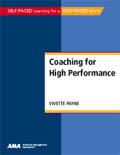Coaching for High Performance
Author: Vivette Payne
Credit: 1.0 CEUs
Testing Format: multiple choice
Your Price: $159.00
ISBN: 9780761214618
Format: Book
Overview
Coach employees to ensure maximum performance, motivation and retention.
Following a seven-step coaching process, Coaching for High Performance gives managers the tools to help their people excel at their jobs and meet competitive challenges with confidence. This course teaches managers how to communicate performance expectations, assess employee skill levels, establish the purpose of coaching, and agree on a coaching contract. Managers will learn the critical skills needed to conduct coaching conversations, adapt one’s coaching style to fit changing situations, and create a coaching plan.
Course Objective: Develop the skills to coach employees to ensure maximum performance, motivation, and retention.
Selected Learning Objectives
• Establish your mission and role as a coach
• Deliver feedback in any situation
• Use coaching skills to motivate and retain employees
• Coach employees across generations and throughout the employment life cycle
• Enhance team performance and channel conflict constructively
• Handle difficult coaching situations with insight and skill
Testing Format
This course contains one mulitple choice test valued at one Continuing Education Unit (CEU).
Table of Contents
About This Course
How to Take This Course
Pre-Test
1. The Importance of Coaching 1
What Is Coaching?
Why Coaching Is More Important than Ever
Keeping Customers Happy
Producing High Quality Products and Services
Managing Continuous Change
Retaining Top Talent
Working in Collaborative Networked Organizations
Building Personal Capability to Match Performance Demands
Reinforcing Business Practices
Empowering Breakthrough Results
Attributes of a Good Coach
Discern What the Coachee Needs
Demonstrate a Results Orientation
Work as a Thinking Partner
Encourage the Coachee
Provide Sound Advice
Demonstrate Respect for the Coachee
Desire and Willingness to Be a Coach
Getting Ready to Coach
Recap
Review Questions
2. Getting in Shape to Coach 21
Clarify Your Coaching Mission
Understand Your Coaching Role
Coaching to Develop Others
Coaching to Maximize Performance
Coaching for Learning
Coaching for Change
Build Strong Rapport with Coachees
Invest in Coaching Relationships
Understand Your Coaching Style and Approach
Recap
Review Questions
3. The Coaching Process, Steps One to Four 41
Step One: Communicate Your Expectations
Step Two: Assess Coachees’ Competence and Motivation Level
Low Competence and Motivated
Low Competence and Not Motivated
Competent and Motivated
Competent and Not Motivated
Highly Skilled and Highly Motivated
Highly Competent and Not Motivated
Coaching Each Skill/Motivation Level
Step Three: Define the Purpose of Coaching
Step Four: Agree on a Coaching Contract
Recap
Review Questions
4. The Coaching Process, Steps Five to Seven 57
Develop Effective Listening Skills
Staying Focused
Understanding the Message
Respecting the Coachee
The Listening Process
Example: Effective Listening
Answer to Exercise 4–1: Improving Kristen’s Listening Skills
Your Listening Skills
Formulate Strong Questioning Techniques
Qualities of Effective Questions
Answer to Exercise 4–3: What’s Wrong with This Question?
Major Types of Questions
Step Five: Conduct Coaching Conversations
The Appraisal Conversation
The Encouragement Conversation
The Teaching Conversation
The Probing Conversation
The Correcting Conversation
The Commitment Conversation
Answer to Exercise 4–4: Your Coaching Conversation
Planning Your Coaching Conversation
Step Six: Create the Coaching Plan
Step Seven: Monitor and Learn
Example of Monitoring and Learning
Answer to Exercise 4–6: Monitoring Coaching Effectiveness
Recap
Review Questions
5. Delivering Coaching Feedback 79
Getting Ready to Give Feedback
Giving Effective Feedback
Most Common Complaints About Feedback
Characteristics of Effective Feedback
The Do’s and Don’ts of Coaching Feedback
Example of Delivering an Effective Feedback Message
Preparing to Conduct Your Feedback Meeting
Delivering Difficult Feedback
Just-in-Time Feedback
Peer Feedback
Asking for Feedback
Recap
Review Questions
6. Coaching for Motivation and Retention 97
What is Motivation?
What Motivates Employees
Example of What Motivates Employees
Understanding Akim’s Motivators
Coaching and Motivating
Baseline Expectations of All Employees
Understanding the Demographics of Your Workforce
Coaching the Multigenerational Workforce
Description of Each Group
Coaching Each Generation of Workers
The Employment Life Cycle
Coaching Throughout the Life Cycle
Recruitment and Selection
Orientation and Acclimation
Performance Management
Rewards and Recognition
Recap
Review Questions
7. Coaching Teams for High Performance 115
The Role of the Team Coach
Coaching Long Distance
Coaching for Continuous Improvement
Step 1: Initiate Discussion
Step 2: Pursue Improvement Goals
Step 3: Pursue More Significant Improvements
Step 1: Make Continuous Improvement a Way of Life
Dealing with Failure
Example: The Failed Membership Drive
Answer to Exercise 7–4: Ed’s Plan for Dealing with Failure
Peer Coaching
Recap
Review Questions
8. Handling Difficult Coaching Situations 135
Identifying Coaching Pitfalls
Sample Coaching Situations
Sample Responses
Building Trust in Difficult Situations
Difficult Coaching Situations
Coachee Is Not Committed
Unrealistic Expectations
Passive Approach
Failure to Take Risks
Fear of Failure
Dependency on the Coach
Blaming Others
Strategies for Dealing with Common Coaching Problems
Coaching Teams Through Conflict
Conflict on Karen’s Team
Answer to Exercise 8–1: Resolving Conflict on Karen’s Team
Recap
Review Questions
Bibliography
Recommended Resources
Post-Test
Index

